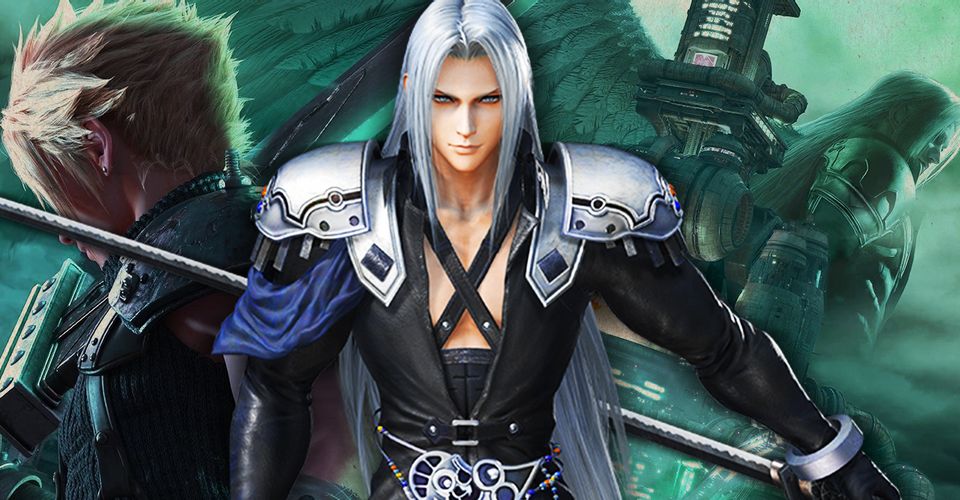
Few video game villains are as well-known as Final Fantasy VII's Sephiroth. The character is infamous for burning the hero Cloud's hometown and murdering a potential love interest. His razing scene has become one of the most iconic moments in gaming history, and his antagonism towards the hero is similarly-regarded. It's easy to see why Square Enix is devoted to keeping him in the public consciousness. A consistent feature of these cameos, however, is that they increasingly glorify Sephiroth's achievements and inflate his power.
Though a great warrior in the original game, he was still just a man who could be killed with enough skill and determination. By the time of Final Fantasy VII Remake, he has apparently become a transcendent being capable of warping space-time. While fans of the character may enjoy this increased prominence, such elevations may counter-productively be making him a less impressive antagonist.
CBR VIDEO OF THE DAY
Related: The Five Most IMPRACTICAL Swords in Gaming
In the original game, Sephiroth was compelling because of his intellect. He was certainly mighty but by no means unbeatable. In fact, his abilities throughout the Nibelheim flashback are only slightly above what the main characters can achieve. Long before players ever fight the man, the game's own mechanics confirm he is not beyond them. In fact, Sephiroth spent most of Final Fantasy VII in a weakened state, forcing him to work through agents to enact his will. This created an illusion of omnipresence that made him seem stronger than he truly was, tying neatly into the game's subtle horror elements.
By comparison, the modern Sephiroth has no need for such stratagems. He enjoyed a significant power boost in the sequel movie Advent Children, gaining the strength to level buildings and warp the weather with a single stroke. Crisis Core reinforced this portrayal, and further emphasized his strength and speed as beyond anything the protagonist was capable of. While the extent of his power in the Remake is unknown, what players have seen makes it clear that he's surpassed even these incarnations.
From an aesthetic perspective, this makes sense. The world of FFVII has been getting increasingly anime-like since Advent Children, and its creators want to keep fans engaged by showing off how dangerous their favorite villain is. However, while the resulting spectacles are impressive, they also undermine the story's plausibility. After all, if Sephiroth has always been a person of mass destruction, then there's simply no way Cloud should have won at the reactor.
Related: The Next Final Fantasy Should Be Designed After the Series' Most Iconic Art Style
Compare this to how the original game depicts Sephiroth. While it certainly regards his means with monstrous terror, FFVII is surprisingly dismissive of the man himself. He is depicted, quite literally, as a loser; being canonically beaten in every duel with Cloud, only coming close to godhood through deception. Sephiroth has to resort to trickery because he can't win in a fair fight. This is why most of his appearances turn out to be disguised aspects of his genetic forebear Jenova. From a certain point of view, the game's writers are insinuating that their villain is so weak as to require his mother to beat up his enemies for him.
This may seem a humorous observation, but it's not the only time FFVII depicts Sephiroth as pathetic. In fact, the game draws audacious parallels to history throughout the Nibelheim sequence. The flashback makes it clear that his heroic reputation is merely a result of being the ShinRa Corporation's favorite attack dog. When he discovers the research used to create him, he becomes convinced of his supremacy and goes on the now-infamous rampage. Like the fascists of reality, Sephiroth proclaims himself part of a superior race and sets out to exterminate those he now deems lesser, all based on nothing but bad science and his inflated sense of entitlement. Further underscoring these failings, his final form is the infamous one-winged angel; not the god he wanted to be but a comparatively lesser and incomplete being.
This unglamorous portrayal of is, fittingly, the apotheosis of FFVII's theme of self-improvement. Cloud idolized Sephiroth as a child, but as an adult must recognize that he was never worth emulating. Indulging the fantasy of succeeding one known only for strength, even unwittingly, is what leaves him vulnerable to the villain's manipulations. It is only when he accepts himself that he breaks Sephiroth's control, symbolically rejecting the hollow strength of his foe. FFVII concludes on the note that such men are cruel, abusive and utterly unworthy of respect, and fittingly regards him with none at all.
Related: Kingdom Hearts: Sora Almost WASN'T The Game's Protagonist
Yet, despite being the ones who wrote this incredibly important message, Square Enix seems to have largely forgotten it. Every appearance Sephiroth has made since the original game has downplayed his callous traits in favor of making him stronger and cooler. He can punch a man across the sky, shatter buildings with one swing of his sword, and even got close to killing Mario himself in his Super Smash Bros. debut. He is consistently portrayed as the series' strongest warrior, and any mention of his attempted ethnic cleansing is dropped like the world's most uncomfortably hot potato.
It's understandable why Square Enix might want to water Sephiroth down for spin-offs and cameos. The character is among the darkest of all the series' villains. More faithful representations would probably be too bleak to justify party game appearances. That's not an inherently bad thing, marketing and popularity can affect positive character growth. But, his wretched past hasn't been replaced with anything beyond mere power. Without any limitations to force creative thinking, Sephiroth has become an incredibly dull shadow of his former self. One can only hope that, as the Remake's story advances, its writers find some way to help Meteor's master regain the impact he once had.
Keep reading: Kingdom Hearts III Skipping Final Fantasy Characters Helped the Game
